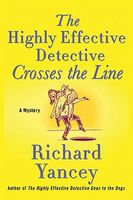 |
| Abandon hope, all ye who enter here |
"I say, Larwood, is this tax-planning business really as exciting as these Daffodil characters seem to think or do they just make believe it is to make life more interesting? I mean, if I'd known it was all about codes and secret documents and biffing chaps in false beards, I wouldn't have minded going in for it myself."Sarah Caudwell is one of my all-time favorite mystery writers and she was a tax lawyer. Sadly, she died young, though I don't think tax had anything to do with it. But before she left us, she did the unthinkable: she made a tax lawyer a featured and lovable character in a series of mysteries: Thus Was Adonis Murdered, The Shortest Way to Hades, The Sirens Sang of Murder and The Sibyl In Her Grave. True, her Julia Larwood character is probably about as far away from most people's conception of tax lawyers as you can get.
Her appearance in The Sirens Sang of Murder gives us a glimpse of what Julia is like: "Her hair was no more than usually disheveled, her clothing no more than normally disordered, and she stumbled, in her progress towards the bar, over no more than the customary number of briefcases." Julia is charming, a sparkling conversationalist and more than a little good-looking but, as Hilary Tamar, Sarah Caudwell's protagonist observes:
"Poor Julia's inability to understand what is happening, or why, in the world about her, her incompetence to learn even the simplest of the practical skills required for survival—these must have made it evident, even in childhood, that she would never be able to cope unaided with the full responsibilities of adult life."Julia is always going in for mad, money-making schemes, like her collaboration with her friend and fellow young lawyer, Michael Cantrip, to write "a novel, based on their experiences of life at the Bar and to be entitled Chancery!, which they confidently expected to earn them wealth beyond the dreams of avarice and so free them from the tyranny of their respective Clerks." (The Sirens Sang of Murder) And she needs that money. In Thus Was Adonis Murdered, Hilary Tamar explains that the Inland Revenue has ruined Julia:
"Julia's unhappy relationship with the Inland Revenue was due to her omission, during four years of modestly successful practice at the Bar, to pay any income tax. The truth is, I think, that she did not, in her heart of hearts, really believe in income tax. It was a subject which she had studied for examinations and on which she had thereafter advised a number of clients: she naturally did not suppose, in these circumstances, that it had anything to do with real life."Unsurprisingly, in Thus Was Adonis Murdered, Julia becomes Suspect Number One in the murder of an Inland Revenue agent she meets when she is on an Art Lovers' tour of Venice. Now, if that revenue agent had been Richard Yancey, maybe he wouldn't have ended up dead. Yancey, the author of the highly entertaining Teddy Ruzak (the Highly Effective Detective) mystery series, also wrote Confessions of a Tax Collector: One Man’s Tour of Duty Inside the IRS. The book is a lightly fictionalized picaresque memoir of Yancey's 12 years as a tax collector or "Revenue Officer."
This isn't a mystery, but it is a detective story. Yancey is a classic antihero-type, on a lonely quest to track down the bad guys; in this case, tax delinquents, especially tax protesters. As Sam Spade occasionally found of those who hired him, Yancey's employer is a powerful and harshly demanding master. Culpepper, Yancey's Clint Eastwoodesque trainer tells him that "you could drive down any street in America on any given day, and I guarantee you over half of the businesses you pass would have tax trouble. . . . Maybe that's because the system's too complex or people are stupid or a combination of both, I really don't care. The point is, that's why we're here." When Yancey replies: "To help them," Culpepper sets him straight: "Don't be ridiculous. Oh, maybe that happens, like a happy accident, but helping people isn't your job, Yancey. You want to help people, become a social worker. Our job is to feed the beast." That is, the U.S. Treasury.
Scared witless and confused by his job, Yancey spends his days bombing down back roads with Culpepper and confronting tax delinquents in trailer parks, dental offices and strip malls, poring over legal records to try to find assets he can seize, and engaging in jungle warfare against an assortment of malcontents, misfits and backstabbers back at the office. Profoundly ambivalent about his job at the start, his personal life is in a shambles and he decides to devote his energies into becoming the best possible Revenue Officer.
By the end of his "tour of duty," Yancey is changed in every way. He loses almost all of his previous connections, including a fiancée and, after an extended period of insomnia and poor eating habits, slowly rebuilds his life. From a self-described pencil neck, he works out every night until he transforms himself into a fine physical specimen. He even manages to find love in the IRS. Seriously.
Best of all, for our sake, Yancey leaves the IRS and becomes a mystery writer. He doesn't write about the IRS, though. This is not surprising, considering that although he is quoted as saying how much he values his experience there and believes in the need for all citizens to pay their taxes, he was nervous about his own taxes after writing Confessions of a Tax Collector, because of what he calls the IRS's known vindictive streak. But if you've ever read a Teddy Ruzak book, you have to think that some of Yancey's experiences during his tour of duty came in handy. Teddy has a talent for absurd and labrythine thinking, as well as a way of annoying suspects and witnesses so much that they end up telling him a lot more than they'd intended just to get rid of him.
I doubt there is anything I could write to give anyone a benevolent feeling about taxes, but I hope I can persuade some of you to give Sarah Caudwell and Richard Yancey a try.


